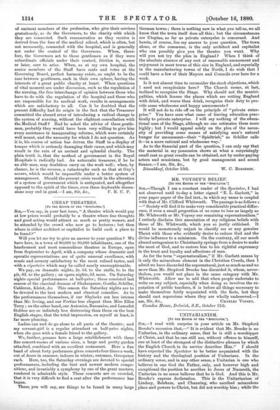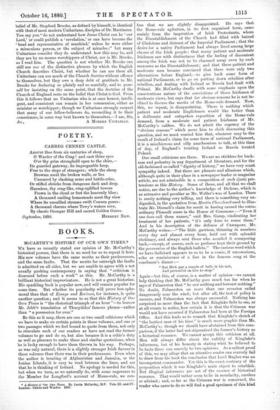UNITARIANISM.
[To THE EDITOR OF THE "SPECTATOR.")
read with surprise in your article on Mr. Stopford Brooke's secession that,—" It is evident that Mr. Brooke is no Unitarian, in the ordinary sense, that he is still a worshipper of Christ, and that he can still use, without offence to himself, one at least of the strongest of the distinctive phrases by which the English Church in its service describes Him." I should have expected the Spectator to be better acquainted with the history and the theological position of Unitarians. In the ordinary sense, and in any other sense, a Unitarian is one who believes in one God the Father, only, and however high and exceptional the position he ascribes to Jesus of Nazareth, the Unitarian in no sense believes that he is God. And this is Mr. Brooke's express declaration. This is the Unitarianism of Lindsey, Belsham, and Charming, who ascribed miraculous place and powers to Christ, but did not worship him ; while the belief of Mr. Stopford Brooke, as defined by himself, is identical with that of most modern Unitarians, disciples of Dr. Martineau. You say you " do not understand how Jesus Christ can be our Lord,' or could publish a revelation,' or can have become the
head and representative of mankind,' unless he were either a miraculous person, or the subject of miracles ;" but many Unitarians consider they do understand how this may be, and they are by no means worshippers of Christ, nor is Mr. Brooke, as I read him. The question. is not whether Mr. Brooke can still use one of the distinctive phrases by which the English Church describes Christ, but whether he can use them all. Unitarians can use much of the Church Service without offence to themselves, but they owe a deep debt of gratitude to Mr. Brooke for declaring so plainly and so manfully, and to your- self for insisting on the same point, that the doctrine of the Church of England rests on the belief that Christ is God. From this it follows that no Unitarian who is at once honest, intelli- gent, and consistent can remain in her communion, either as minister or worshipper ; though we Unitarians strongly suspect that many of our fellow-believers do, reconciling it to their consciences, in some way best known to themselves.—I am, Sir,



































 Previous page
Previous page